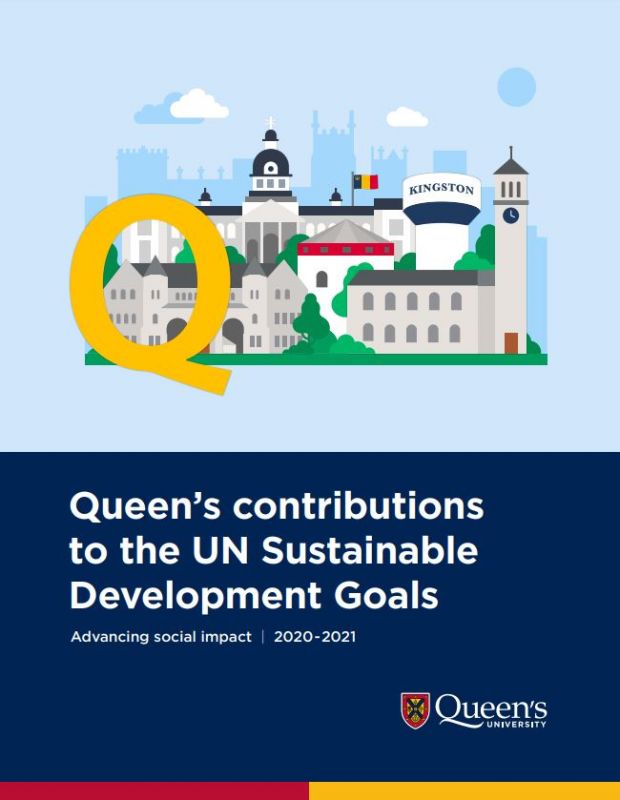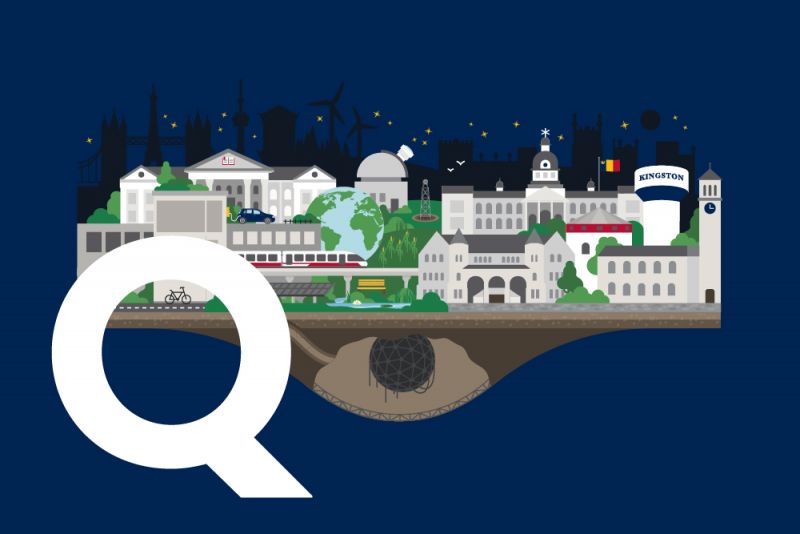Queen’s secures second consecutive top 10 position globally in Times Higher Education Impact Rankings
Queen’s places 7th in international rankings out of over 1,500 institutions in advancing the United Nations’ Sustainable Development Goals.

Capturing 7th position globally, Queen’s is ranked in the top 10 of the Times Higher Education (THE) Impact Rankings for the second year in a row. The rankings measure the actions universities are taking to advance the United Nations’ Sustainable Development Goals (SDGs) both within and beyond their local communities. This 2022 international competition saw participation from over 1,500 post-secondary institutions (up from 1,240 in 2021).
Created in 2019, the THE Impact Rankings are the only international assessment to evaluate how universities’ programs and initiatives align with the SDGs. This set of 17 wide-ranging goals is central to the 2030 Agenda for Sustainable Development, a universal call to protect the planet and its people.
"I am incredibly proud of the Queen’s community for this repeat stellar performance," says Patrick Deane, Principal and Vice-Chancellor, Queen’s University. "The ranking recognizes the sustained impact we are having in our local and global communities, but also serves to inspire future action fueled by our collective intellectual curiosity, passion to achieve, and commitment to collaboration – key to our mission and values."
Using calibrated metrics and indicators across four key areas – research, teaching, outreach, and stewardship – the rankings assess hundreds of data points and qualitative evidence that tangibly measure the impact of higher education institutions in addressing urgent global challenges. Since its inaugural year in 2019, participation in the THE Rankings has increased from 450 institutions to 1,500 participating institutions across 110 countries in 2022. This includes 400 first-time ranked institutions and 24 Canadian universities.
"The Times Higher Education Impact Rankings are unique in examining universities’ impact on society, through each of the 17 United Nations’ Sustainable Development Goals," says Phil Baty, Chief Knowledge Officer, Times Higher Education. "Canada is one of the outstanding performers in this ranking, with ten universities in the world top 50 – and it is great to see Queen’s among Canada’s leading institutions, making the world top 10 and excelling in its contribution to SDG 1, and SDG 11, and SDG 16, in particular. It is important to be able to identify and celebrate the work universities do to make the world a better place."
Queen’s performance
Queen’s results once again reflect the cross-university collaboration and partnership of dozens of units across faculties, portfolios, and departments. Highlights from the 2022 rankings include:
- Queen’s was ranked across all 17 SDGs
- 2nd worldwide for SDG 1: 'No Poverty.' Queen’s strong performance acknowledged the Commitment Scholars program, which provides financial support for students who are members of underserved or underrepresented groups and who have demonstrated leadership in, and commitment to, racial justice, social justice, or diversity initiatives, and Swipe it Forward, a peer-to-peer program that facilitates the donation of meals to students facing food insecurity
- 3rdworldwide for SDG 11: 'Sustainable Cities and Communities.' Queen’s supports public access to green spaces, including self-guided tours of the university’s Snodgrass Arboretum, free trail access at Elbow Lake Environmental Education Centre, and the castle gardens at the Bader International Study Centre in the UK. State-of-the-art cultural facilities – including the Isabel Bader Centre for the Performing Arts and the Agnes Etherington Art Centre – showcase world-class performing arts and collections to the community
- 2nd worldwide for SDG 16: 'Peace, Justice and Strong Institutions.' In addition to significant collaboration with all levels of government and training the next generation of policy makers though the School of Policy Studies, Queen’s supports academic freedom and is a member of the Scholars at Risk program, which arranges temporary research and teaching positions for scholars whose lives, freedom and well-being are under threat
- Queen’s ranked in the top 100 of 12/17 SDGs and in the top 30 of 8/17 SDGs
Evidence of impact
 More than 600 pieces of quantitative and qualitative evidence looked at Queen’s research, teaching, outreach, and stewardship and included:
More than 600 pieces of quantitative and qualitative evidence looked at Queen’s research, teaching, outreach, and stewardship and included:
- Queen’s partnership with the Karta Initiative to provide educational opportunities to low-income youth from rural India
- The new Queen’s Institute for Global and Population Health, created to boost research, education, service, and collaborative projects that will help advance and decolonize global health systems
- Black Youth in STEM, an outreach program engaging Black elementary students in science, technology, engineering, and math programming through fun, hands-on activities in a Black-positive space
- Leanpath Spark, a program to measure food waste and foster education and inspire action in Queen’s dining halls
- A new Campus Map focused on accessibility to assists campus visitors in navigating Queen’s buildings and accessible routes, entrances, washrooms, and more
- The Queen’s University Biological Station, one of Canada’s premier scientific field stations dedicated to environmental and conservation research and outreach
- Supporting and connecting women of all ages through the Ban Righ Centre, dedicated to diversity and community building
- Queen’s commitment to reducing its carbon footprint and meeting its goal for a 35 per cent reduction in emissions between 2008 to 2020
- A website and report created to illustrate Queen’s commitment to the SDGs and showcase programs and initiatives that address some of the world’s most pressing challenges
The Queen's University’s community of exceptional students, researchers, staff, and alumni all contribute to making a positive contribution to social impact and sustainability. For more information on the THE Impact Rankings and how the university is contributing to the SDGs, visit the Advancing Social Impact website.

Note: This article originally appeared in the Queen's Gazette.

